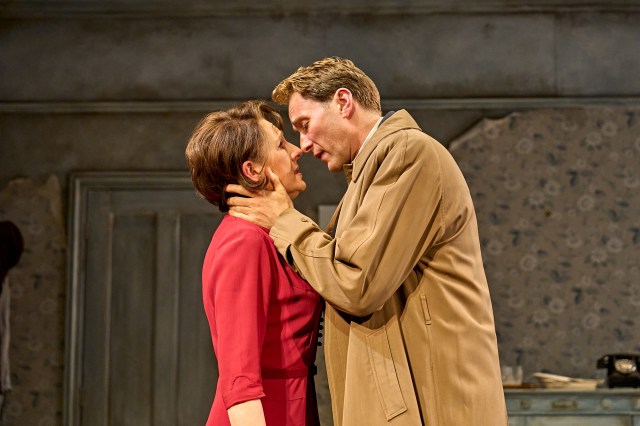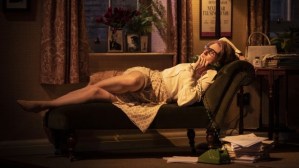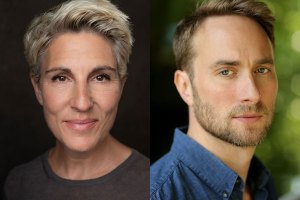The Deep Blue Sea at Bath’s Ustinov Studio – review
Tamsin Greig and Oliver Chris lead the new revival

It begins with a body lying in front of a gas fire and ends with its hopeful flickering. In between, Terence Rattigan’s unarguable 1952 masterpiece The Deep Blue Sea, is one of the great theatrical roles, Hester Collyer; heartbroken and gradually defiant as the sun rises and sets over one momentous day. Since the Rattigan renaissance began in the early 2010s we’ve seen some of the great performers essay Hester, Helen McCrory’s performance above all glimmers in the mind, and now it is the turn of Tamsin Greig to climb the mountain.
If I’d say hers is a good rather than momentous take on the role, it is because she lacks the volcanic eruptions that turn the very best into something as elemental as human. Greig is all humanity in her performance, every moment carefully considered, from her wringing hands when she feels the guilt of her husband’s presence, to the pawing need for her younger lover. Greig is never less than watchable and finds the odd moment of humour that she wrings for each cynical laugh, but it’s almost as if, playing this role which lacks the comedic edge that we’ve seen from her in so many past roles, that it diminishes the spark, her Hester is overwhelmed but it translates into the performance as well, it’s only in the plays final act that we begin to see the motor purr.
Rattigan’s most personal play (an ex-lover gassed himself a few years before the play premiered and inspired Rattigan to put pen to paper), The Deep Blue Sea is a tightly structured three-acter, where Hester ping-pongs between her calm, composed ex-husband who makes a play for her return and her younger lover, permanently sozzled and unable to give his heart in the way she desires. The way Hester loves can’t be reciprocated by either of them, unable to give in their own ways – in the programme essay Dan Rebellato argues that the queer coding that some place on the play isn’t there, but it’s hard not to draw parallels between one woman who can’t be her full self between the subterfuge and hidden dimensions of her romantic entanglements.
As her pilot lover Freddie, Oliver Chris brings a more ridiculous than smouldering side to her dashing amour. With his Stanley Stubbers elocution, he’s a man-child unable to articulate his own pain. Yet there is a lack of darkness and charm to suggest Hester’s sexual pull, his Aguecheek one to mother rather than love. Interestingly, director Lindsay Posner has chosen TV sitcom stalwarts (Felicity Montagu – Lynn in Alan Partridge – plays landlady Mrs Elton) in key roles, and yet the funniest performance of the evening comes from Finbar Lynch’s Miller, the struck-off doctor who comes to Hester’s aid. With his dry asides and pragmatic approach, most of the dry laughs are sparked by him, until his shuffled shoulders and slow gait are revealed to be physical manifestations of his own mental turmoil.
Nicholas Farrell as her ex-husband brings courtly manners to the depilated Ladbrook Grove bedsit that Peter McKintosh’s design brings to wallpaper peeling life, his calm demeanour and good grace a reminder of all that Hester is throwing away in her pursuit of the unobtainable. The Ustinov is always a showcase for acting of the highest quality, and it is littered throughout this thoughtful revival of Rattigan’s masterpiece. If it doesn’t quite tear out the heart, it’s a reminder that even when love often freezes time, the world revolves regardless.















